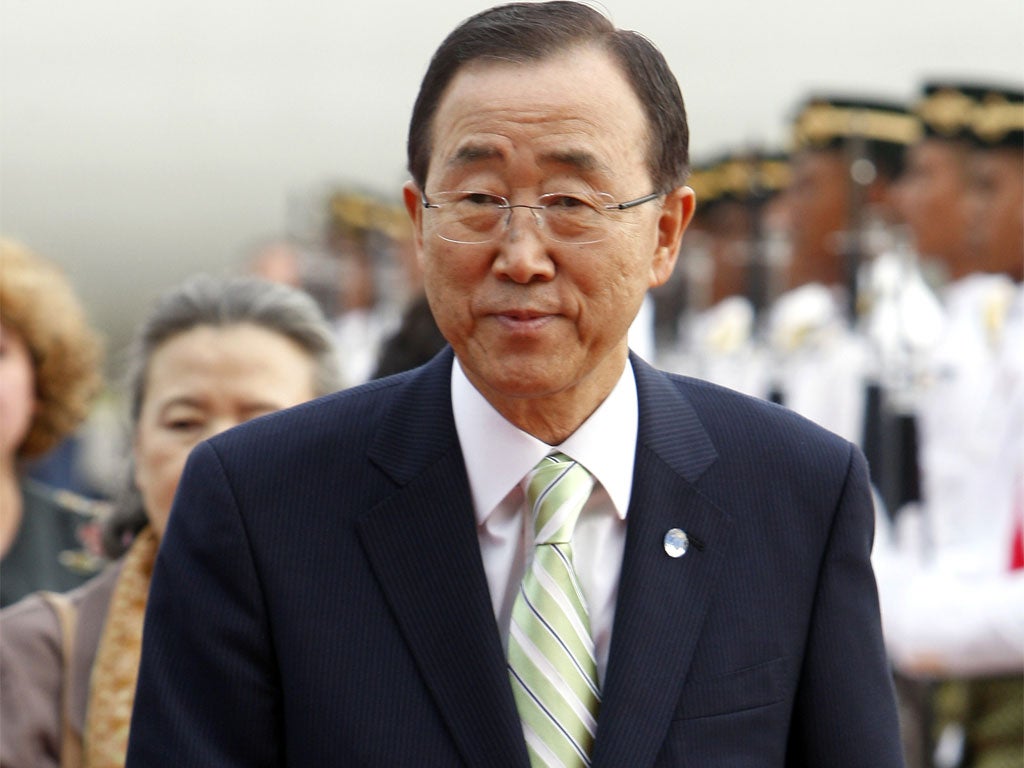UN finally agrees peace plan for Syria – but will it end bloodshed?
Russia and China fall into line – but Ban Ki-moon admits fallout from conflict could spread through the region

As smoke drifted above the eastern suburbs of Damascus after a renewed attempt to crush resurgent rebel fighters yesterday, the diplomatic gridlock at the United Nations appeared to have eased when Security Council members agreed to pass a statement calling for an end to the violence in Syria.
The move came as the UN Secretary-General Ban Ki-moon issued a grave warning about the "massive repercussions" which could result from the continued bloodshed in Syria. "We do not know how events will unfold. But we do know that we all have a responsibility to work for a resolution of this profound and extremely dangerous crisis," he said in a speech in Indonesia.
At the Security Council, Western powers have been trying for months to take action against President Bashar al-Assad following his year-long crackdown. Their efforts to pass a resolution demanding his removal have twice been torpedoed by Russia and China, but yesterday the two nations agreed to rubber-stamp a so-called "presidential statement" issued through the Security Council.
Unlike a resolution, a statement is not legally binding. Yesterday's document called for the backing of a peace plan drafted by Kofi Annan, the former UN chief, which demands an immediate cessation of violence from all sides and the creation of humanitarian aid corridors. Yet the document which emerged from the Security Council yesterday was a heavily diluted compromise statement.
With equal weight given to the Baath party regime and defected opposition soldiers, it called on Mr Annan to encourage all sides in the conflict to lay down their arms and halt troop movements. Unlike the original draft, it also gave no timeframe for the measures to be implemented. It did, however, threaten Syria with "further steps" if it fails to comply with Mr Annan's proposals.
But activists remained sceptical. "We only hear talk and speeches," said an activist calling himself Zeyad, who fled Syria four days ago after leaving his home in the Damascus suburb of Douma. "We don't see any action."
Rime Allaf, a Syria expert from Chatham House, a UK think-tank, also said she was "pessimistic" about the UN statement having any tangible effect. "This statement isn't going to push the regime to lessen its repression," she said. "On the contrary, it provides it with more legitimacy."
Yesterday's development came after a week in which clashes between rebel fighters and regime forces again erupted in around the Damascus. The suburbs of Harasta and Irbin, a few miles east of the capital's ancient walled centre, came under heavy tank bombardment as President Assad's generals tried to prevent the nationwide uprising inching closer to the heart of power.
Army helicopters were reportedly heard flying over the area as artillery and anti-aircraft guns pounded rebel positions, according to activists. The Local Co-ordination Committees, a network of activists, said 52 civilians were confirmed dead yesterday, including 10 children. Among them were four young men from Homs who were tortured to death following their arrest at a checkpoint. Near the north-west city of Idlib, an entire family were shot dead when security forces fired at their car. Given reporting restrictions inside Syria, it was not possible to verify the claims.
The clashes in Harasta and Irbin came after an eruption of violence earlier this week in the upmarket Damascus neighbourhood of Mezzeh. The district – a heavily guarded area of embassies and villas – echoed to the sound of explosions and machine-gun fire as security forces battled rebel gunmen through the night. Two days earlier, there was further chaos in the capital when 27 people were killed in a twin suicide bombing.
In a statement posted on a militant website, an Islamist group called the Al-Nusra Front to Protect the Levant claimed responsibility for the bombs and warned: "What is coming is more bitter and painful, with God's will."
Join our commenting forum
Join thought-provoking conversations, follow other Independent readers and see their replies
Comments